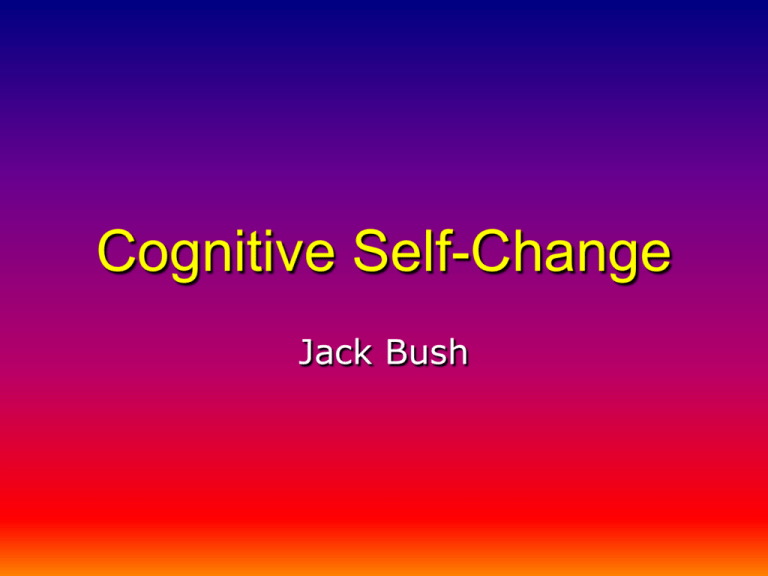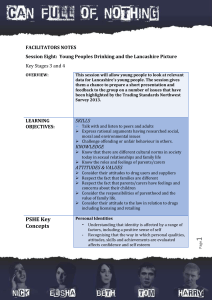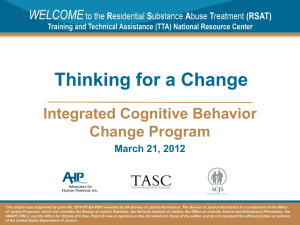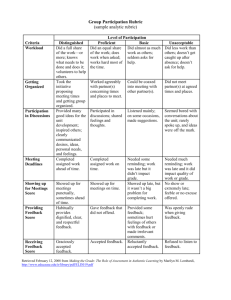Cognitive Self-Change
advertisement

Cognitive Self-Change Jack Bush Cognitive Skills vs Criminal Thinking Cognitive Skills Problem Definition Problem Solving Perspective Taking Stop and Think Generating Alternatives Testing Solutions Cognitive Self-Change Thinking Controls Behavior When Thinking Changes, Behavior Changes “We don’t demand that offenders change. We do require that they learn how to change.” Each Group Cognitive Check-Ins Thinking Reports Timing Check-Ins 3 to 5 minutes Thinking Reports 1 hour 4 Steps in Cognitive Self Change 1. 2. 3. 4. Report thoughts, feelings, attitudes and beliefs. Recognize how they lead to hurtful actions. Use new thoughts, attitudes and beliefs that lead away from trouble. Practice Cognitive Check Ins 1. 2. 3. 4. Situation of inappropriate behavior or temptation of inappropriate behavior Report thoughts, feelings, attitudes & beliefs How they put them at risk Describe alternative thinking or could have used Cognitive Check Ins Offenders only do Steps 1 & 2 until proficient Only then add Step 3 Offenders only do Steps 1, 2 and 3 until proficient Then add Step 4 Thinking Report Situation/Thoughts/Feelings/Attitudes Offender presents draft Thinking Report Situation “An officer told me to pick up a piece of paper on the floor at chow. I got angry and cursed at him. I got a DR for disrespect and disobeying a direct order.” Thinking Report Thinking “Fuck you, you fucking want-to-be cop. If you want it picked up bad enough, pick it up yourself. I have a good mind to drive you right where you stand. If you ask me instead of telling me then maybe I’d pick it up, asshole.” Thinking Report Feelings Anger, victimized, singled out Attitudes/Beliefs Cops are assholes. I have a right to be respected. Additional Thoughts 1. 2. 3. 4. “You get off on telling people what to do. I’m sick of being insulted around here. All these cops are alike. I can’t take any more of this shit.” Additional Feelings Belittled Disrespected Additional Attitudes & Beliefs “The only way to get respect is to let people know you’ll hurt them if they don’t. Without the ability to be violent, no one will respect you. When someone orders me to do something, they are disrespecting me.” How Thoughts Led to Behavior Clear Transition “We have a pretty good picture of how Marcus was thinking and feeling. Now let’s do Step 2. Let’s look at how these thoughts and feelings led to the behavior.” Key Pieces Leading to Risk Which thoughts led to behavior? Ask group. Ask offender if he agrees. Key Pieces Thoughts 1. “Fuck you, you fucking want-to-be cop. 2. You get off on telling people what to do. 3. I’m sick of being insulted around here. 4. I can’t take any more of this shit.” Key Pieces Feelings Anger, belittled, disrespected Key Pieces Attitudes & Beliefs “The only way to get respect is to let people know you’ll hurt them if they don’t. Without the ability to be violent, no one will respect you. When someone orders me to do something, they are disrespecting me.” Key Pieces Trigger 1st Key Thought Key Pieces Trigger 1st Key Thought Next Key Thought Key Pieces Trigger 1st Key Thought Next Key Thought Next Key Thought Key Pieces Trigger 1st Key Thought Criminal Act Next Key Thought Next Key Thought “Fuck you, you want-to-be cop.” “Fuck you, you want-to-be cop.” “You get off . . .” Feeling disrespected “Fuck you, you want-to-be cop.” “You get off . . .” Feeling disrespected “I’m sick of being insulted . . .” Feeling disrespected & angry “Fuck you, you want-to-be cop.” “You get off . . .” “I can’t take . . .” Feeling disrespected “I’m sick of being insulted . . .” Feeling disrespected & angry “Fuck you, you want-to-be cop.” “I cursed him.” “I can’t take . . .” “You get off . . .” Feeling disrespected “I’m sick of being insulted . . .” Feeling disrespected & angry Steps of Thinking Report 1 Identifies additional thoughts/feelings 2 How They led to troublesome behavior a) Identification of key “risk pieces” b) Connection between risk pieces 3) Replace old thinking with new thinking What the process is Reporting thoughts, feelings & attitudes What the Process Isn’t Explaining Describing Justifying Thoughts, feelings and attitudes Language: What Not to Say Don’t give them examples Don’t interpret Don’t tell then what you would have been thinking/feeling Don’t use your words instead of theirs What to Ask Other Group Members Does this look like it was all the thoughts and feelings? What could you ask to help him remember more? Language: How You Say It Matters Can you remember any more thoughts . . I’m not sure what you mean by . . . Can you explain it to me? What was the very first thought (feeling) you had . . . Did these thoughts go with particular feelings? How do they fit together? Language: How You Say It Matters Was there a feeling that went with this thought? (a thought with the feeling?) Was there a thought/feeling that fit between the ones you’ve listed Was there a kind of attitude behind these thoughts (feelings)? Do you have a general belief about this kind of situation? What does it sound like? Completion Criteria A completion of a set of specified tasks Achievement of “competency” in each step Completion of a minimum time in treatment Personal Risk Management Plan Past acts of violence and crime, circumstances, thoughts, feelings, attitudes, beliefs Past relapse behaviors Description and examples of current, everyday situations that trigger risk thinking Goals and plans for minimizing future risk of violence and crime Goals and Plans Specific plans for avoiding risk situations Coping strategies when in risk situations Description and examples of new thinking How new thinking will be used in risk situations and every day situations Elements of Program Check-Ins Thinking Reports Individual Journal Assignments Fearless Criminal Inventory Personal Risk Management Plan Staff Tasks Prepare for each group Review each group Document each group Conduct regular progress reviews Focus intently on process Progress Reports 2 to 3 months Formal meeting Prepare Summary Form Go over progress and deficits ½ hour + Treatment Completion Complete tasks Thinking reports Cognitive check-ins Group presentations Journal assignments Special tasks Length of Program 6 to 22 months Impact of Cognitive Self-Change Program Length Of Time (Months) New Accusations After Years 1 2 3 7+ 25% 42% 1–6 0 49% 49% 67% 80% 71% 77% (Bush, 1995) 46%








